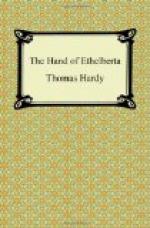Now the postmaster was an acquaintance of Christopher’s, but, as regarded putting that question to him, there was a difficulty. Everything turned upon whether the postmaster at the moment of asking would be in his under-government manner, or in the manner with which mere nature had endowed him. In the latter case his reply would be all that could be wished; in the former, a man who had sunk in society might as well put his tongue into a mousetrap as make an inquiry so obviously outside the pale of legality as was this.
So he postponed his business for the present, and refrained from entering till he passed by after dinner, when pleasant malt liquor, of that capacity for cheering which is expressed by four large letter X’s marching in a row, had refilled the globular trunk of the postmaster and neutralized some of the effects of officiality. The time was well chosen, but the inquiry threatened to prove fruitless: the postmaster had never, to his knowledge, seen the writing before. Christopher was turning away when a clerk in the background looked up and stated that some young lady had brought a packet with such an address upon it into the office two days earlier to get it stamped.
‘Do you know her?’ said Christopher.
’I have seen her about the neighbourhood. She goes by every morning; I think she comes into the town from beyond the common, and returns again between four and five in the afternoon.’
‘What does she wear?’
‘A white wool jacket with zigzags of black braid.’
Christopher left the post-office and went his way. Among his other pupils there were two who lived at some distance from Sandbourne—one of them in the direction indicated as that habitually taken by the young person; and in the afternoon, as he returned homeward, Christopher loitered and looked around. At first he could see nobody; but when about a mile from the outskirts of the town he discerned a light spot ahead of him, which actually turned out to be the jacket alluded to. In due time he met the wearer face to face; she was not Ethelberta Petherwin—quite a different sort of individual. He had long made up his mind that this would be the case, yet he was in some indescribable way disappointed.
Of the two classes into which gentle young women naturally divide, those who grow red at their weddings, and those who grow pale, the present one belonged to the former class. She was an April-natured, pink-cheeked girl, with eyes that would have made any jeweller in England think of his trade—one who evidently took her day in the daytime, frequently caught the early worm, and had little to do with yawns or candlelight. She came and passed him; he fancied that her countenance changed. But one may fancy anything, and the pair receded each from each without turning their heads. He could not speak to her, plain and simple as she seemed.




